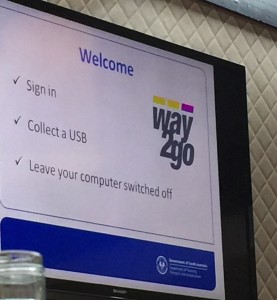Category: 1. Know students & how they learn, 2. Know the content & how to teach it, 3. Plan and implement for effective teaching & learning, 4. Create and maintain supportive & safe learning environments, 5. Assess, provide feedback and report on student learning, 6. Engage in professional learning, 7. Engage professionally with colleagues, parents/ carers and the community
Tags: @CEGSAustralia, @gcouros, @jlamshed, CEGSA, Connecting, DECD, frustration, George Couros, http://georgecouros.ca/blog/, Jarrod Lamshed, Karen Buttler, professional development, Twitter
This term, I’ve been feeling flat. A feeling of being over committed, and frustrated with time restraints has been a little overwhelming. A ‘not so inspiring’ professional development session last Monday certainly didn’t help. With this on top of all the usual frustrations of a teacher’s life I have not been at my enthusiastic best. This is not to say that everything has been bad. I am working with a great team of teachers on some innovative and exciting stuff, it’s just been lost in the ‘muddle’ for the last few weeks.
With this lacklustre state of mind I wandered off to my first CEGSA (Computers in Education Group of South Australia) committee meeting on Thursday night and went through the motions of beginning my newest commitment. I can’t say I was feeling enthusiastic at the thought of an after hours meeting, but I had committed so I went along and joined the conversation. After the committee meeting I had the opportunity to attend a ‘spotlight’ session with George Couros. It was the beginning of the rejuvenating process.
George’s session, titled ‘What to Look for in Today’s Classroom’ was energising. As the session progressed and the tweeting began, I began to feel the fog lift. I began to refocus on the exciting parts of the job and recommit to my ongoing list of goals. By the end of the session I had re-established some important connections with people but had also re-established a connection with my job.
Thursday’s session was followed by a full day ‘master class’ with George. At this event I attended as a support person. My role was to support participants as they worked with George to set up their own online professional portfolios linked with the Australian Professional Standards for Teachers. Even though I was there as a troubleshooter, the learning for me was huge and once again I came out inspired with a new list of goals for my teaching and learning as well as that of my students.
Now, I have seen George present on several occasions before (maybe not quite to the extent of a stalker), and each time there is a feeling of excitement in the room. Over both sessions this week, it was clear that this would be no different. I had many conversations with participants at both sessions who ‘got it’. Comments about the quality of the PD sessions were overwhelmingly positive. All of the people I spoke to felt that this was the best and most relevant training session that they had been to in a long time. As I did, people had come away with a drive to take action and make positive change in their classroom and school.
This week, twitter has been alive with conversation about George’s sessions. Apart from the usual discussion from classroom teachers it has been great to see the discussion from our leaders in DECD head office. It is obvious from the conversation they also ‘get it’ as is evident in this post by Karen Butler of the Digital Learning team in DECD.
All too often, the positivity generated by good professional learning fizzles out because of a focus change in the school or from the department. The ongoing positive change that is being generated here needs to be harnessed. It’s time to capture the moment and give access to this learning to as many people in our schools and department as we can. There is a movement beginning and with ongoing support and co-operation from supporting organisations like DECD and CEGSA, there is no reason that this learning can’t be ongoing and long lasting.
The learning that George is bringing to us creates connections. Connections that are essential to ongoing improvement and learning in our classrooms and our department. As a new member of the CEGSA committee I feel like I am now part of a group that can work to support this important learning and help to effect much needed change in our schools. Working together, with all parties involved, it’s time to ride the wave and create the movement and change that we need. It provides us a chance to open up learning in our schools and look at new ways to move forward and prepare our students for the skills they need now.
After a rejuvenating week, I’m looking forward to the challenge and to seeing what can be achieved. I hope that others are also inspired and are ready to join me in the conversation.



Recent Comments